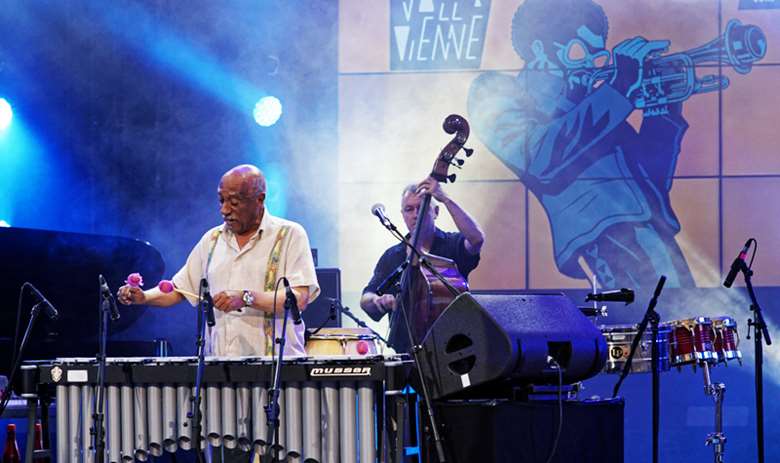Ageless Astatke Leads African Head Charge At Jazz Á Vienne
Friday, July 13, 2018
Jazz á Vienne's annual two-week gathering has been charming crowds for almost four decades, thanks to a diverse and vibrant programme and a headline venue – a stone-built Roman amphitheatre – that never fails to get jaws dropping.

Choosing what to see from this year's embarassment of riches (Ron Carter, Melody Gardot, Marcus Miller, more) wasn't easy. But after a 20-minute taxi ride from Lyon and a meander around an old town festooned with images of this year's mascot – a Miles-meets-Marvel trumpet player (courtesy of graphic artist Brüno), it was up the hill to the Théatre Antique, with its vertiginous terraces and summit dotted with temples and ancient statues, and an Africa-themed night boasting three A-listers.
Mulatu Astatke, the daddy from Addy, led a seven-piece outfit of UK-based players, among them cellist Shanti Paul Jayasinha, fresh from Orphy Robinson's remarkable Voicestra Polyphonic Collective debut at the Gibraltar World Music Festival. Astatke, 74, seemed reinvigorated by his music, a hypnotic meld of funk, soul, latin jazz, Ethiopian tones and extra heavy percussion, gifting us stints on congas, timbales, vibes and keys: effortlessly, elegantly dexterous. This line-up, give or take the odd change, has been with Astatke for a while and no wonder, what with John Edwards' bass thundering mightily alongside percussionist Richard Olatunde Baker's chattering krakeb castanets, Byron Wallen's warm and expansive horn vying with James Arben's fierce tenor-sax squalls and a loose-limbed Hawkins perched, Gould-like, at a baby grand, delivering chords chewy enough to get your teeth into.
Then came Malian singer/songwriter Rokia Traore, barefoot and regal in a blue shift dress, a Stratocaster around her neck, the fire in her belly almost palpable. Flanked by musicians on electric bass, guitar and riffing ngoni lute, aided by a kit drummer on a mission, Traoré unwound slowly, her lyrics in French and Bambara crisp and pure, her charisma mesmerising. Traoré is a committed boundary pusher who has long blended traditional West African rhythms with jazz, folk and rock. She has previously covered 'Strange Fruit' and collaborated with the likes of the Kronos Quartet, but here she worked on adding layers, establishing grooves. Laying aside her guitar, she danced with a fluid freneticism, taking back the mic to sing of the power and beauty of Africa, of its challenges and riches. It was a consummate performance cheered on by the 7,000 plus crowd. That new Mama Africa mantle is in the bag.
Standing centre-stage in a white and gold boubou, Youssou N'Dour spread his arms and delivered 'New Africa', an exhortation to work together for change, to consider the legacy of pan-Africanists Cheikh Anta Diop and Kwame Nkrumah. Formerly Senegal's minister for culture, N'Dour has left political office and his music, refreshed, has benefitted. Africa's most successful singer, N'Dour garnered attention in the 1980s as the golden-voiced leader of Etoile de Dakar (a 'jazz orchestra' that like similarly designated ensembles in the region – represented a modern African negritude) and created the popular dance style, mbalax, fusing jazz, rock and latin music with traditional rhythms. Surrounded by stalwarts including maestro percussionist Babakar Faye, pounding a row of conical sabar drums into submission with a stick, and axeman Jimi Mbaye, firing lightning bolts from a Fender Strat (with which he also recreated the sound of the kora), and with keys, kit drums, two backing singers, a tama talking drum player and a face-off between Faye on djembe and a somersaulting acrobat/dancer, this was a Senegalese-style soul revue with hit after hit and encore 'Redemption Song' raising clenched fists along the terraces.
Down in the 350-capacity Theatre Municipal Vienne, the experimental Jazz Mix series kicked off at midnight with London's Ruby Rushton, here in trio format. Led by Ed 'Tenderlonious' Cawthorne on flute, beats and soprano sax, with Aidan Shepherd on keys and Tim Carnegie on drums, they served up spiritual jazz mains including 'Prayer for Yusef', along with edgy Hancock-esque fusion, holding their own under mercilessly hot stage lights before a gaggle of drunken twenty-somethings.
Special mention, too, to the following night's late nighters: Lagos-based guitarist Keziah Jones, who improvised a thrilling set under the stars at 2am. Representing Dalston's Total Refreshment Centre were improvisation dons Ill Considered, a London quartet featuring tenor saxophonist Idris Rahman, who squalled and snaked through, around and alongside the freeform expression of Emre Ramazanoglu on drums, Yahael Camara-Onono on percussion and way-out-there bassist Leon Brichard. Their intense free jazz had a 1960s devotional vibe and the potential to take them further, to a summit, perhaps, and beyond.
– Jane Cornwell
– Photo by Pierre Corvaisier